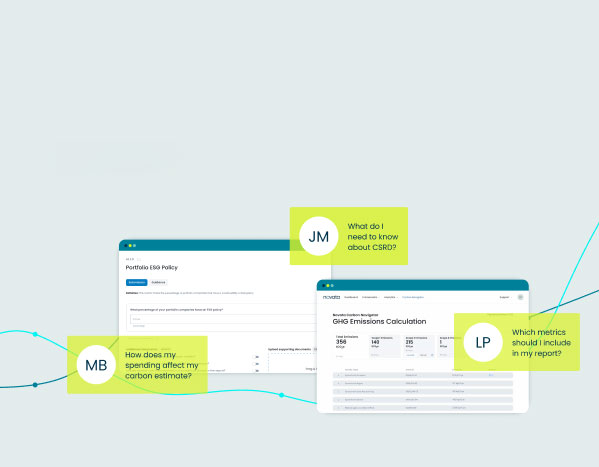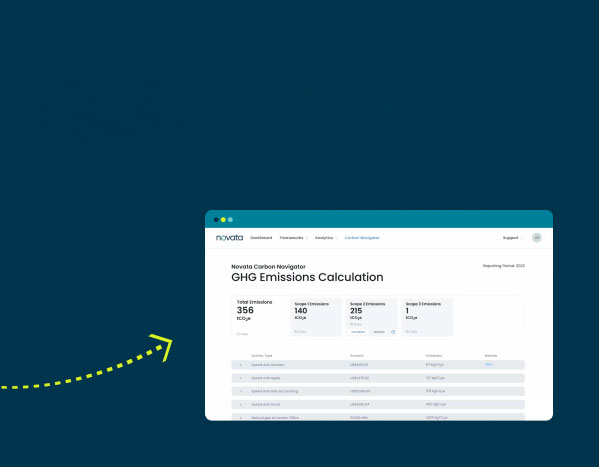Environmental, social, and governance (ESG) issues have become key considerations for private equity firms amid pressure to incorporate these factors into business practices. From investors to consumers, stakeholders of all sorts are increasingly using ESG data to evaluate businesses and inform decisions.
For instance, 90% of institutional investors in the U.S. say they review ESG factors with the same scrutiny as operational and financial considerations, according to Edelman. However, the heightened focus on ESG has inevitably led to higher scrutiny of ESG data and increased regulatory requirements. To help break down the current landscape, Lorraine Wilson, Chief Impact Officer and Head of ESG at Novata, hosted a webinar discussion with Paul Yett, Director of ESG & Sustainability at Hamilton Lane; Sofia Dolores Martos, Partner at Kirkland & Ellis; and Allison Spector, Head of ESG at One Rock Capital.
The webinar highlighted the need for private equity firms to pay attention to changes in the ESG space, as they are increasingly asked to report on ESG data. Here are three factors driving the changing expectations and why building your ESG strategy today is critical for responding to growing pressures.
1. Global regulatory requirements are evolving quickly
In the U.S., private disclosure of ESG data is still largely voluntary. But Sofia Martos noted that disclosure requirements for public companies, such as the SEC’s recent proposed rule disclosing climate-related risks, can have a ripple effect on private firms. These disclosure requirements will have private market implications for suppliers or customers of publicly traded companies that could be required to report on Scope 1, 2, and 3 emissions.
From a global perspective, U.S. firms that operate internationally have to comply with regional standards such as the EU’s Sustainable Financial Disclosure Regulation (SFDR) and the Corporate Sustainability Reporting Directive.
According to the experts, even when disclosures are not yet mandatory, it’s important to understand the requirements as the scope of these regulations is rapidly evolving and subject to change.
2. ESG data is informing investment decisions
ESG data provides crucial insight into how a company is responding to emerging societal and climate risks, which has been shown to play a larger role in investment decisions.
Hamilton Lane’s Paul Yett highlighted increased interest from LPs in two areas in particular. The first is comprehensive reporting on topics such as board or workforce diversity and greenhouse gas emissions. Secondly, LPs are looking for metrics to help benchmark general partners (GPs) across the ESG landscape. Hamilton Lane, for instance, uses a proprietary system to score GPs, which LPs then use to weigh their investment decisions. According to Paul, the use of metrics like these to understand a company’s plan of action, compare performance, and inform investments will only increase over time.
3. Employees and customers have high expectations for business
Customers and employees are also key stakeholders influencing company decisions around ESG. Studies show that these groups have high expectations for business and are willing to take action to demonstrate their support.
In a JUST Capital report, 80% of consumers said they would go out of their way to support companies that publicly report operational statistics over those that do not. Similarly, a PwC study found that 86% of employees prefer to support or work for companies that care about the same issues they do.
With values alignment as an important consideration for multiple stakeholders, incorporating ESG into business practices and strategies will help you remain competitive.
Begin Developing Your ESG Strategy
From conducting a materiality assessment, to identifying objectives and measurable targets, it takes time and resources to develop an ESG strategy. Companies looking to report on ESG metrics in 2023 need to start working now. Getting started may seem challenging, but Allison Spector notes that questions from LPs and questionnaires portfolio companies receive as suppliers can provide good insight into what data to report. Additionally, existing ESG reporting frameworks provide a solid foundation to guide the process.
It takes time to build an ESG strategy. To report tomorrow, you must start now. Learn more about how Novata can help you along your ESG journey.






